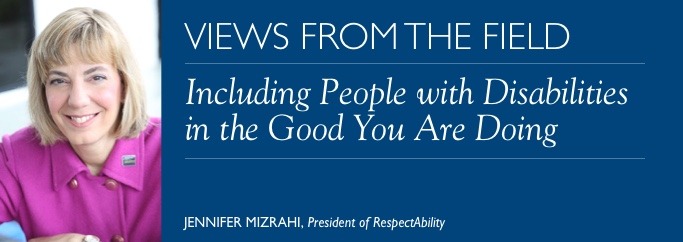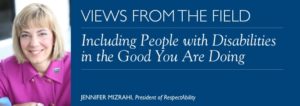
Jennifer Mizrahi, President, RespectAbility
As philanthropy works to solve upstream and immediate challenges to health, people with disabilities are a key group whose health and accessibility needs should be taken into consideration. However, our new study of close to 1,000 people in the social sector, “Disability in Philanthropy & Nonprofits: A Study on the Inclusion and Exclusion of the 1-in-5 People Who Live with a Disability and What You Can Do to Make Things Better,” found that the vast majority of foundations and nonprofits are excluding millions of people with disabilities daily.
For example, only 59 percent of foundations and nonprofits say their events are always held in physically accessible spaces, which means that people who use wheelchairs are shut out from participating. Only 30 percent say they have a process in place to allow people with disabilities to request necessary accommodations (like a sign language interpreter or allergy-free foods) on event registration forms. And only 14 percent say their organizations use captions on web videos to ensure people who are deaf or hard of hearing can access the content (although free rough captions can be automatically generated on YouTube). Hence, people with disabilities do not have the access and accommodations they need to fully participate in the good these groups are doing.
Access is not the only issue facing people with disabilities:
- The lack of school counselors, special educators, and early intervention – especially in under resourced schools – contributes to the school-to-prison pipeline. More than 750,000 people who are incarcerated in our country have a disability.
- Despite the fact that most working age adults with disabilities want to work, only 1-in-3 has a job.
- Immigrants with disabilities are afraid to get services because of public charge issues.
- Huge stigmas and implicit bias hold back people with disabilities. Narrative change is needed around what people with disabilities can do.
The Robert Wood Johnson Foundation, California Wellness Foundation, California Endowment, and others have begun the important work of being inclusive of people with disabilities. And because most things that need to be done are free and simple, even the smallest of foundations and nonprofits can get started.
I have a disability and my husband and I know what it means to raise a child with multiple disabilities. We started a donor-advised fund through Vanguard in 2000, and since then we have supported dozens of nonprofits. In some cases, we directly support disability groups. But much more often we enable nonprofits to get the training, accessibility, and accommodation funds they need to succeed. For example, we enable rape crisis centers to serve victims who are deaf and/or blind. We helped 150 summer camps learn how become more accessible and respectful to children with disabilities. We have reached out to educate every presidential candidate on disability issues and I have been able to meet one-on-one with 46 of America’s governors on issues we are passionate about. We have also been able to help shape the narrative on people with disabilities and health in Hollywood through groundbreaking shows such as Born This Way.
Disability impacts people of all races, genders, and backgrounds and making a difference is much easier than you think. Here are some important steps you can take:
- Commit publicly to the inclusion of people with disabilities. The message that all people, including those with disabilities, are of equal value must be communicated publicly and repeatedly by top leaders.
- Ensure people with disabilities are included in decisionmaking positions, not just for issues related to them but for all issues. Organizations are at their best when they welcome, respect, and include people of all backgrounds. Indeed, problems are best solved by working with people who have experienced them first hand and know solutions that work. Just like issues that impact people of different racial, ethnic, or other backgrounds, people with disabilities should be involved in solving issues that impact them.
- Foster an inclusive environment with your language and practices. What we say makes a difference. Avoid saying things like “wheelchair-bound,” “confined to a wheelchair,” “wheelchair person,” or “suffers from.” Do say “someone uses a wheelchair.” For more information, view a webinar on Disability Etiquette.
- Work with people with disabilities, including RespectAbility, which offers free advice and tools on inclusion; TAPAbility, whichcan source talent; and AskJan.org, which can provide free answers to inclusive employment questions.
- Have an inclusion point person or committee. Add an inclusion statement to your website and event invitations, and train your human resources staff to respond to requests for disability accomodations. Consider including diversity, including disability, as a performance metric for all departments and employees. View AskEarn’s Resource on Disability Inclusion and Ford’s Push for Disability Rights Should Be a Model for Philanthropy for more information.
- Include people with disabilities in your marketing. For example, photos on your organization’s website and your publications should include individuals with visible disabilities.
- Ensure that your website and online resources are accessible. Set up your website for use by screen readers and for people who need captions. Ensure that all photos have alt text, and that all videos have captions. Ensure that your documents (Word, PDF) and presentations (PPT) are accessible. See RespectAbility’s free webinar on web accessibility for more information.
- Ensure the accessibility of your office and events. All of the following must be accessible: invitation/notification of event, facilities, communications and staff/volunteers. For more information, view Physical Accessibility checklist and Event Checklist. Also, view The Chicago Community Trust’s ADA Accessible Resource Guide: https://www.cct.org/wp-content/uploads/2015/08/2015ADAComplianceGuide.pdf.
- Partner with organizations that bring people with disabilities into work in health care organizations. For example, Project Search recruits and trains thousands of people with developmental disabilities each year for work in hospitals and eldercare. Additionally, the University of Michigan’s new Institute for Disability Health is working to lower the hurdles faced by too many of our most promising young minds.
- Promote a disability lens among grantees and partners. Ask your grantees and partners about meaningful and inclusive policies and/or programs; public commitments on website and materials; employing people with disabilities at all levels; inviting people to request accommodations; physical accessibility of office and programs; website accessibility; video captioning; and internal and external educational efforts. Help them to look at intersectional data and impacts.
It will make a huge difference to health outcomes when foundations and nonprofits include people with disabilities, just like anyone else.

